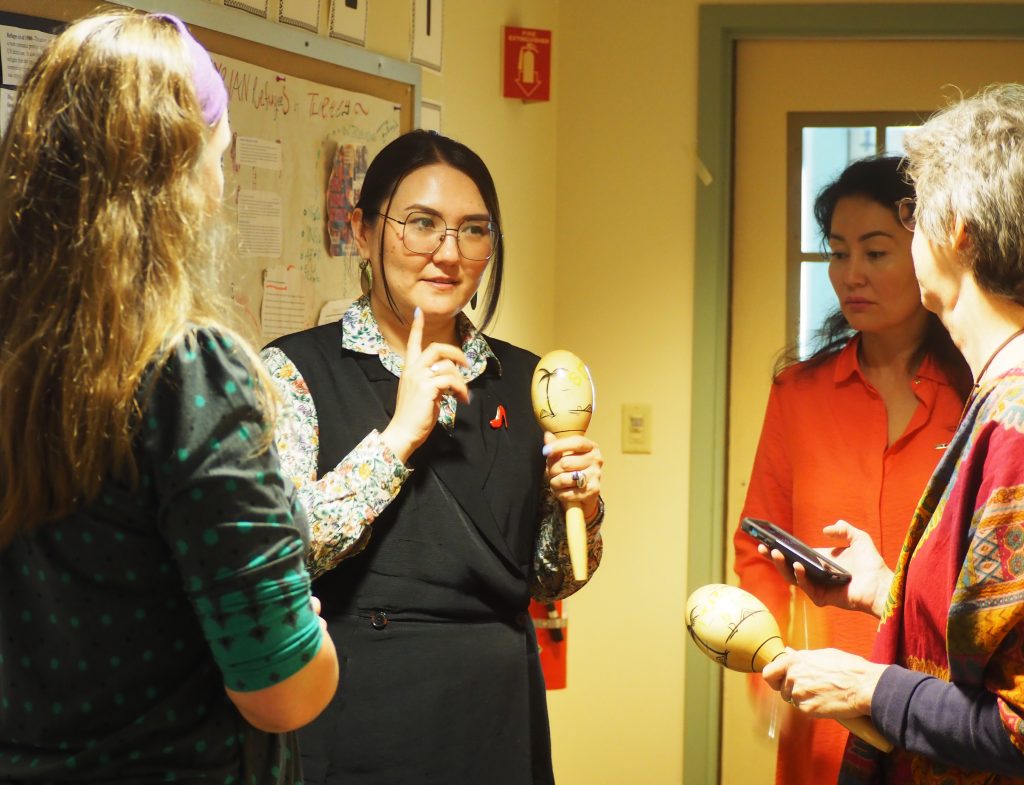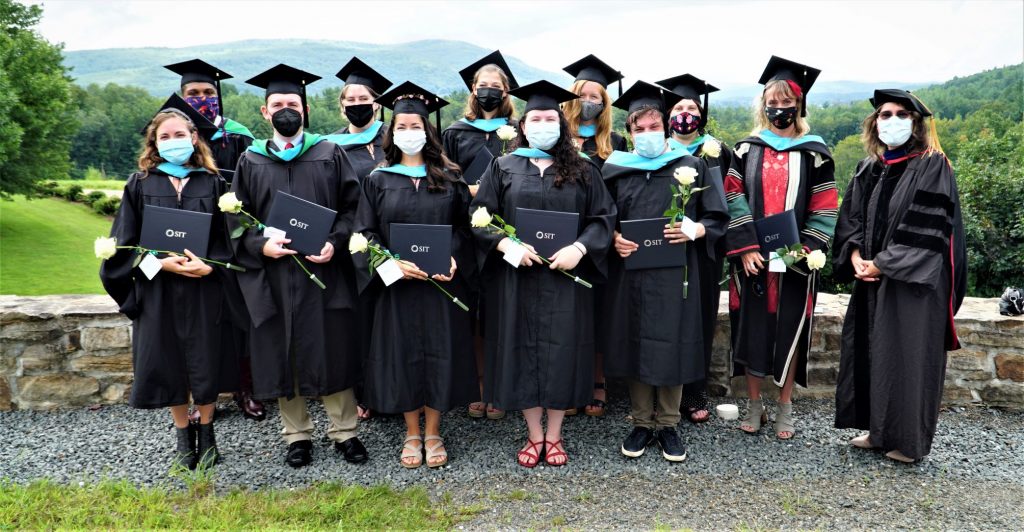
BRATTLEBORO – For the first time in more than two years, graduates crossed the stage in person at School for International Training on Saturday, Aug. 21, during SIT’s 55th commencement ceremony. The event marked a milestone for students who had completed their master’s degrees – some remotely from their homes and others at SIT global centers – during a global pandemic.
Thirty-seven students from the class of 2021 were awarded diplomas during an event that blended in-person and online participation. Two others received graduate-level certificates. Two students from the graduating class of 2020 also participated in person at Saturday’s event.
“Your journey here today was not an easy one – you had real issues and hurdles to overcome,” said keynote speaker Aisha Naomi Cooper, a Liberian American refugee, SIT alumna, and World Learning board member who works at the World Bank. “Those moments made you stronger. It is that resilient spirit, courage, and strong sense of determination that make up your story and build the new generation of leaders that is within each of you.”
Read the full text of the keynote speech by Aisha Cooper
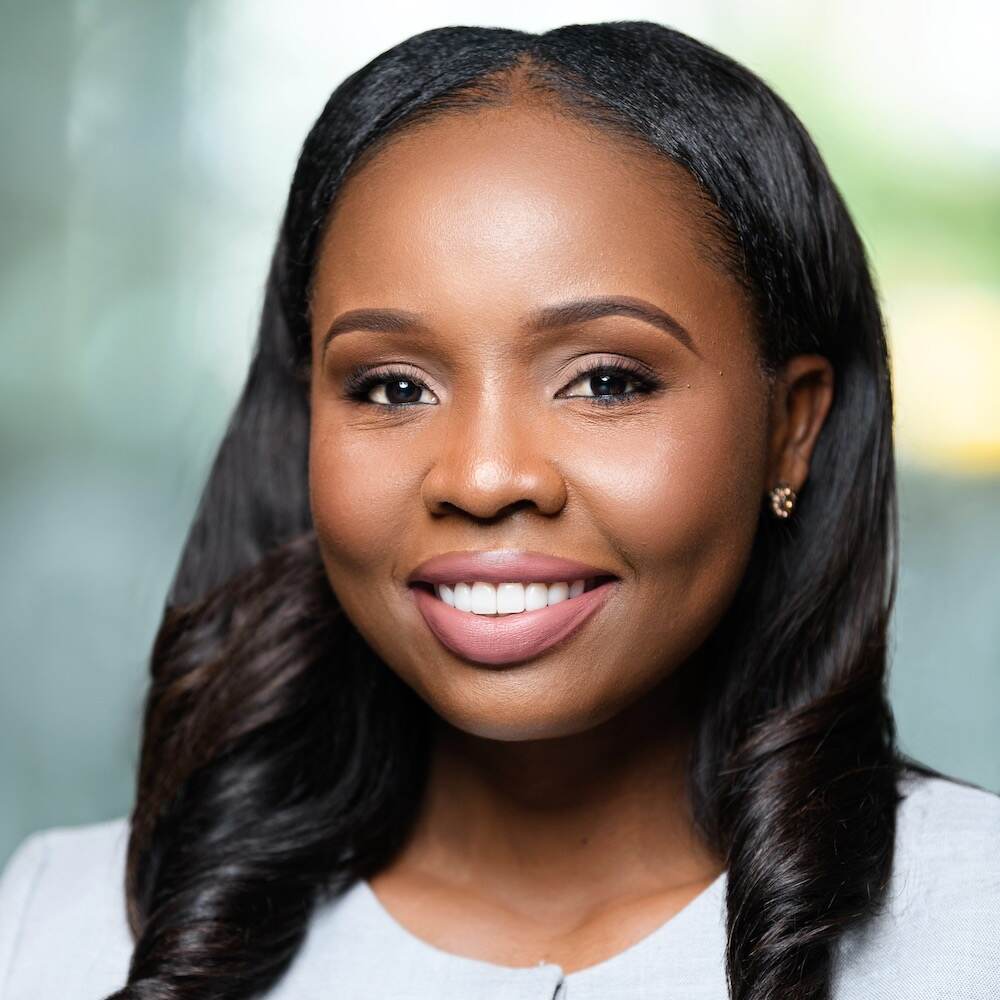
It is that resilient spirit, courage, and strong sense of determination that make up your story and build the new generation of leaders that is within each of you.”
Despite the pandemic, SIT Graduate Institute has continued to offer master’s degree programs online and in person at SIT centers around the world.
Student speaker Danielle Purvis, who earned her MA in Climate Change and Global Sustainability, said her cohort had experienced, “a lock down, then an evacuation, and then a lockdown and an evacuation.” On the climate change program, SIT students spend a semester in Iceland and another in Tanzania.
After calling for a moment of silence for all those lost to COVID-19, Cooper recounted how her own experience living through a civil war in Liberia has led her to support efforts to improve the lives of marginalized people, especially women and girls, around the world.
“In spite of all that you had to endure,” she told the graduates, “I hope you still consider it a privilege to earn your degrees today because there are many students around the world, especially girls, who have been robbed of their full potential due to the lack of access to education, the traps of poverty they find themselves, and threat of the pandemic. Their stories also matter.”
In an address written from his home in Morocco and read by SIT President Dr. Sophia Howlett, Dr. Said Graiouid, SIT dean of faculty, stated, “You will be remembered as the class that did it all. You have weathered the storm and survived graduate school during one of the most difficult sanitary crises in modern history.”
“And yet, we are not surprised,” Said continued. “You are SIT. You are of the tradition of alumni that are ready, despite all headwinds, to engage with the critical global issues that challenge our common humanity.”
You are SIT. You are of the tradition of alumni that are ready, despite all headwinds, to engage with the critical global issues that challenge our common humanity.”
In her own remarks, Howlett reminded the graduates of the contrasts ahead as they confront global issues such as climate change and refugee resettlement. “Changing the world is complicated; it’s messy and it’s difficult, and a lot of times things go wrong,” Howlett said.
“At SIT, you’ve learned about connecting with people, with small communities, with a specific locale or environment, with a local NGO. Go with the knowledge that you will touch lives and places; you have touched them already and they have touched you.
“Always be open to the changes others can have on your lives and remember that we live to connect with others and our environment.”
Read the full text of the speech by Danielle Purvis
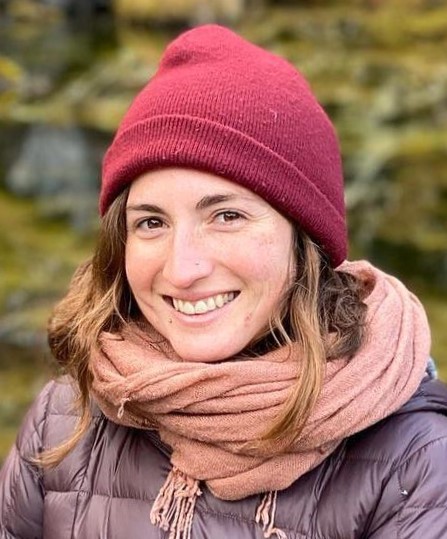
I know, more than ever before, that the ways of this world are unsustainable and must change, and that we get to be on the front lines of building new bridges and creating a new way of life.”
Through her climate change studies, Purvis said, she developed “a global lens of how we are inextricably connected to each other and to our natural environment. And I know, more than ever before, that the ways of this world are unsustainable and must change, and that we get to be on the front lines of building new bridges and creating a new way of life.”
“I’ve learned more from spending this year in other countries, seeing firsthand how a country must make hard decisions to close their borders to protect the health of their people or to keep their borders open to sustain their economies and keep their people fed; how a country’s limited resources can be stretched even more thinly during crises; and how easily systems fail, especially for countries that were already struggling.”
SIT’s last in-person commencement on the Brattleboro campus was in May 2019. A virtual commencement was held in August 2020.
SIT offers MA programs in: Climate Change and Global Sustainability; Development Practice; Diplomacy and International Relations; Global Health; Humanitarian Assistance and Crisis Management; Intercultural Service, Leadership, and Management; International Education; Peace and Justice Leadership; Sustainable Development; and Teaching English to Speakers of Other Languages (TESOL).
The school launched its first EdD, in Global Education, in 2020.
Following is the text of the commencement speech by SIT Alumna and World Learning Trustee Aicha Naomi Cooper. She was the keynote speaker at SIT Commencement on Aug. 21, 2021.

When in doubt, remember that our world needs you—that someone, somewhere on the other side of the world needs you.
Good morning everyone,
It is a great day to be in Brattleboro, to stand with you in celebration of your courage, commitment, and resilience in reaching the finish line.
Chief Executive Jenkins and President Howlett, faculty, distinguished guests here on campus and those connected via Livestream, and most importantly, the graduates of the class of 2020 and 2021.
Wow, today is so special. I am excited to be back in Brattleboro, walking the grounds of SIT. As an alumna it is an honor to be here, this time not as a student in pursuit of a graduate degree like I was in 2012, but standing with you as your keynote commencement speaker. Thank you for this gracious invitation.
Today, I want to share with you the importance of harnessing the power of your stories in paving your path ahead.
There is so much power in your stories, which serve as an opportunity to learn from the past, embrace your present, and act for the future. When I meet people, I am drawn to their stories. I want to know their wow factor: what challenges they have had to overcome; what inspires them; what life lessons have they learned.
You may be wondering: Aicha, how has SIT shaped your story?
My story is this: I come from Liberia, a small country on the West Coast of Africa. As a young girl, I lived through a 14-year civil war that decimated my country’s educational, health, socioeconomic, and political systems. At a young age, I experienced the negative impact war has on women and children. I escaped aboard a cargo ship. In a quest for safety, I almost lost my life.
I became a refugee in Ghana, where I encountered humanitarian workers and development practitioners, global citizens like you who are equipped and committed to change our world. I admired their passion for service, the risk they took to work in fragile and conflicted areas, and I knew without a doubt that I wanted to be like them when I grew up. I wanted to build community and help the less fortunate. I believe that you, too, have a similar desire, which is what has made our paths cross at SIT today. I am one of you. I attended SIT because I believed in its compelling mission to create the next generation of intercultural leaders, professionals, and global citizens.
For me, SIT was the window into the future; the path I needed to realize my life’s aspiration to work as a development practitioner for the world’s leading international finance institution.
My aspiration may be different than yours, but we share a common goal of working to make the world a better place.
So, what about you? What challenges and opportunities are woven into your story?
Our current world affairs have challenged us to adapt, pivot, and learn new lessons. We’ve also seen the emergence of new challenges due to the COVID-19 pandemic—environmental stressors, income disparities, and socioeconomic barriers that hold injustice and inequality in place.
Given the state of our world, each one of you has had to maintain determination, hope, and perseverance amid uncertainty.
Your journey today has not been an easy one—you have had real issues and hurdles to overcome to be here. Some of you had to endure financial challenges, emotional stress, health issues and grief. Some of you had to adjust to new ways of learning with technology. Some of you have had to respond to personal and family matters, and deal with loneliness while still staying dedicated to your education.
Please join me in a moment of silence in honor the lives of faculty, family, and friends we have lost due to COVID-19.
These challenges serve as pivotal moments in your story. They made you stronger. It is that resilient spirit, courage, and strong determination that make up your story and build the leader that is within each of you.
Today, despite all you have had to endure, I hope that, like me, you consider it a privilege to earn your degree from SIT. Too many young people around the world—especially girls—have been robbed of their full potential due to poverty, war, and a lack of access to quality education.
As we gather here, the world is witnessing a grave humanitarian challenge in Haiti. The people of Afghanistan face a political and humanitarian crisis—one that is creating thousands of refugees and internally displaced persons and posing a grave threat to women and girls. With these complex and sensitive issues, you and I—we—must act. We must use the innovative skills we have gained from SIT.
Today is evidence of your drive to take action toward achieving your dreams, aspirations, and commitment to tackling real world problems. No matter how similar or different we may be, your stories—our stories—matter. Your dreams are valid. You are built for that dream, and you have what it takes to make it a reality.
When I look at you, I see World Changers. I see greatness within you. Make the impossible your reality, filled with determination that leads you to endless possibilities.
As you journey on, stay rooted in the power of your story—those gems that make you unique, powerful, fierce, and fearlessly you. Remember, too, there is strength in humility, and that a career built on self only goes so far. Instead, recognize the work of others; be empathetic, and a collaborator. Use your voice and influence for the good of others.
When in doubt, remember that our world needs you—that someone, somewhere on the other side of the world needs you. Even you need you.
I encourage you to continue your strong desire for learning; to cultivate a positive mindset and attitude. Adapt a strong sense of self-awareness. Be intentional about how you show up for yourself and others, and how you build and sustain meaningful relationships, including the ones you’ve formed as a cohort. These will take you far. Zig Ziglar reminds us: “It’s your attitude, not your aptitude, that determines your altitude.”
As you leave here today, I wish you the very best on your journey. May you find your purpose, mold it, achieve it. Paint your legacy on the canvas of society with beautiful strokes and colors symbolizing the importance of global responsibility, women’s rights, human rights, peace, diversity, inclusion, and lead with integrity.
I encourage you to champion the solutions to climate change, political instability, to create a peaceful and just world; to challenge injustices of domestic violence, racism, and all forms of discrimination that are interwoven in the fabric of society.
I encourage you to move past your prejudices and embrace humanity through an inclusive lens of community-building that will help you impact the world make it a peaceful and better place.
I encourage you to be your authentic self. Never settle for mediocrity. Raise your standards and be your own kind of high standards. In all fairness, only then can you expect others to level up.
Most of all, be a little gentle, a little kind to yourself, and never stop believing in the power of you!
Congratulations to all of you.
Thank you.
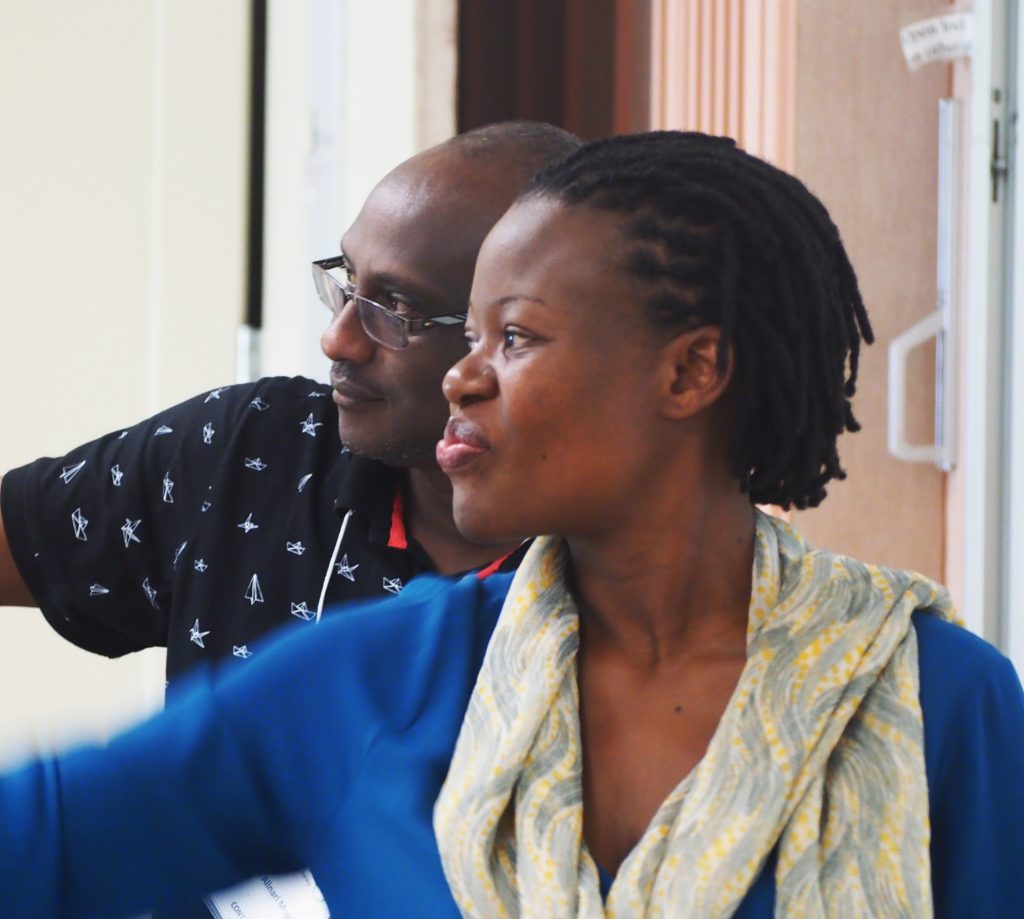
Every summer, an international group of peacemakers gathers on the SIT campus in Vermont. They learn from faculty, but they also learn from the often remarkable experiences of their fellow students.
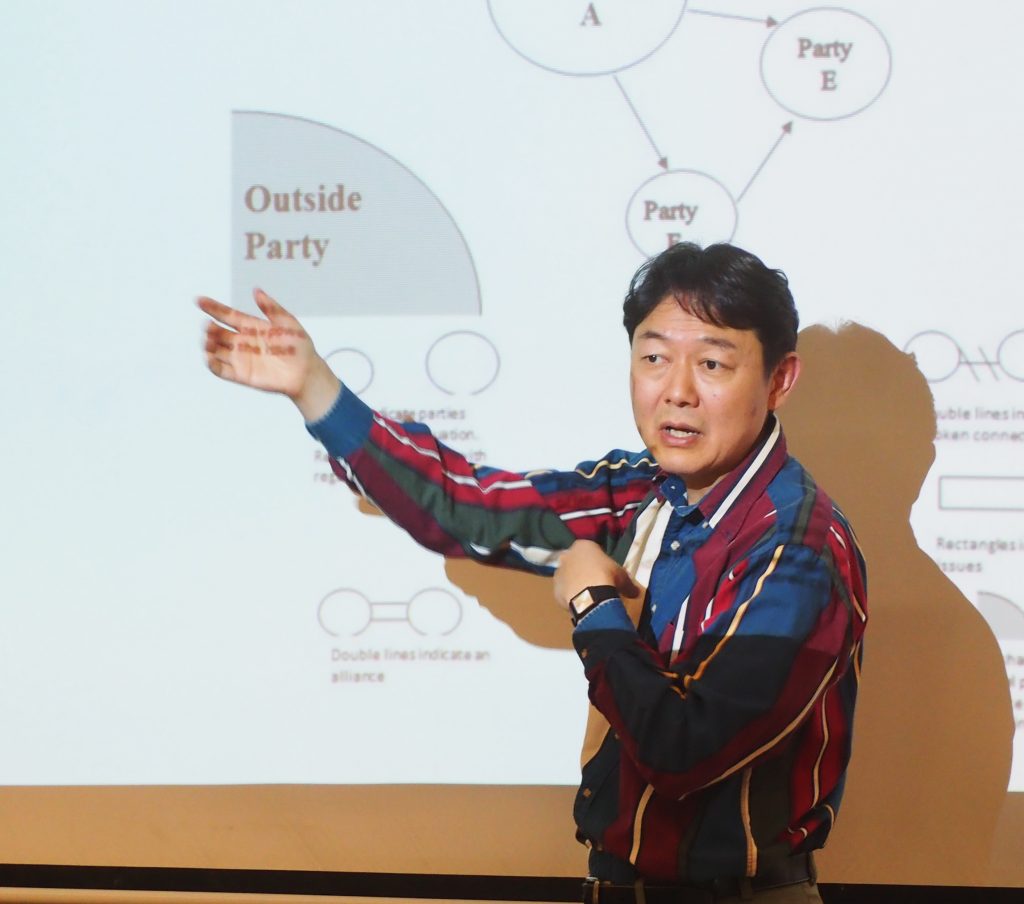
Participants in CONTACT — Conflict Transformation Across Cultures — spend two weeks in Vermont, taking core and elective courses and simply getting to know each other. Many spend a third week in Washington, D.C.
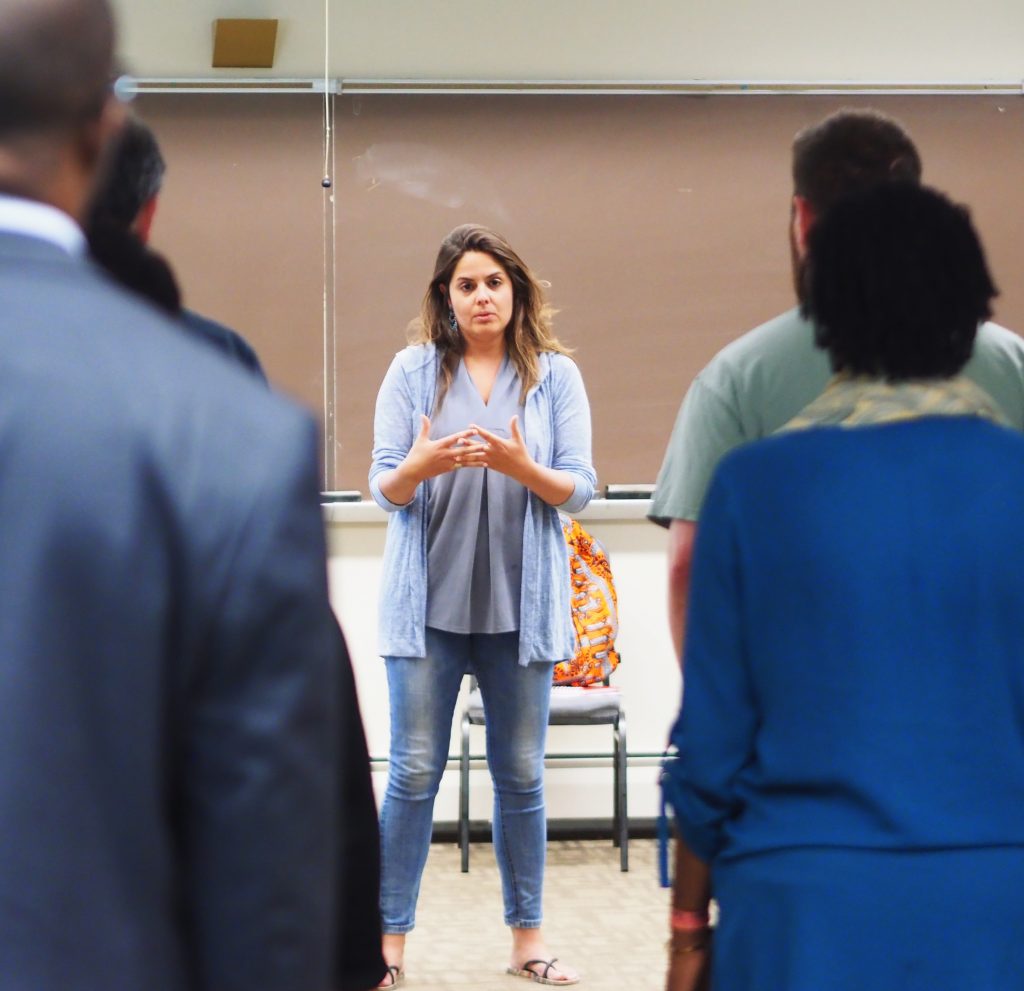
CONTACT classes get down to serious business, discussing intractable conflicts and the details of developing dialogue even in such difficult circumstances. But classrooms often emit sounds of music and laughter — participants lead exercises aimed at shared sense of purpose and cross-cultural understanding before the hard work begins.
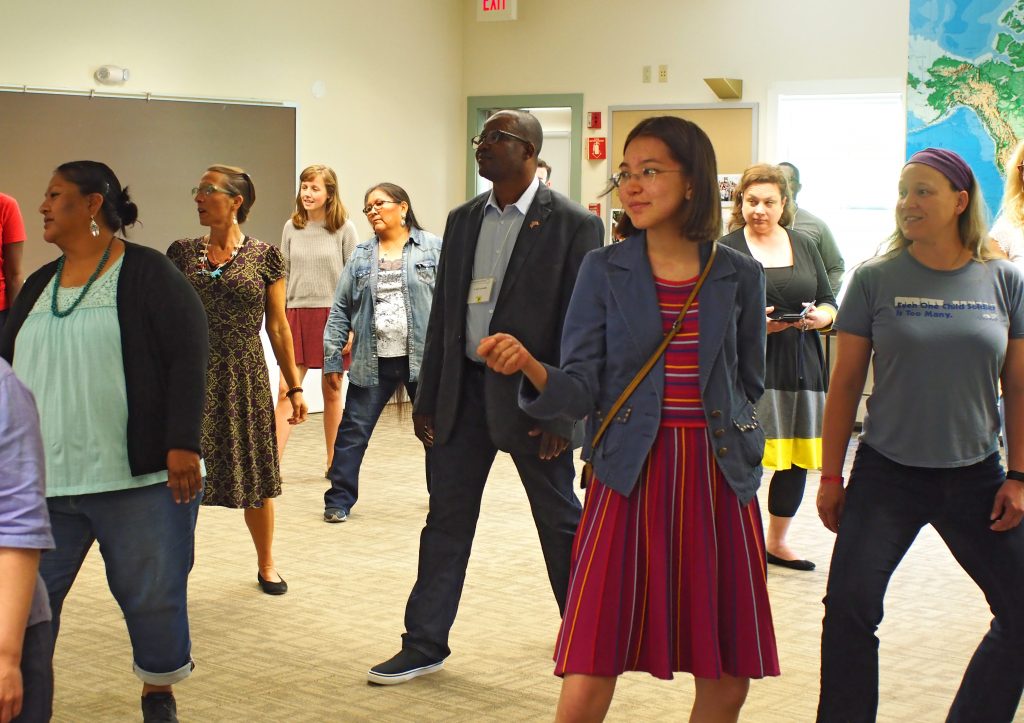
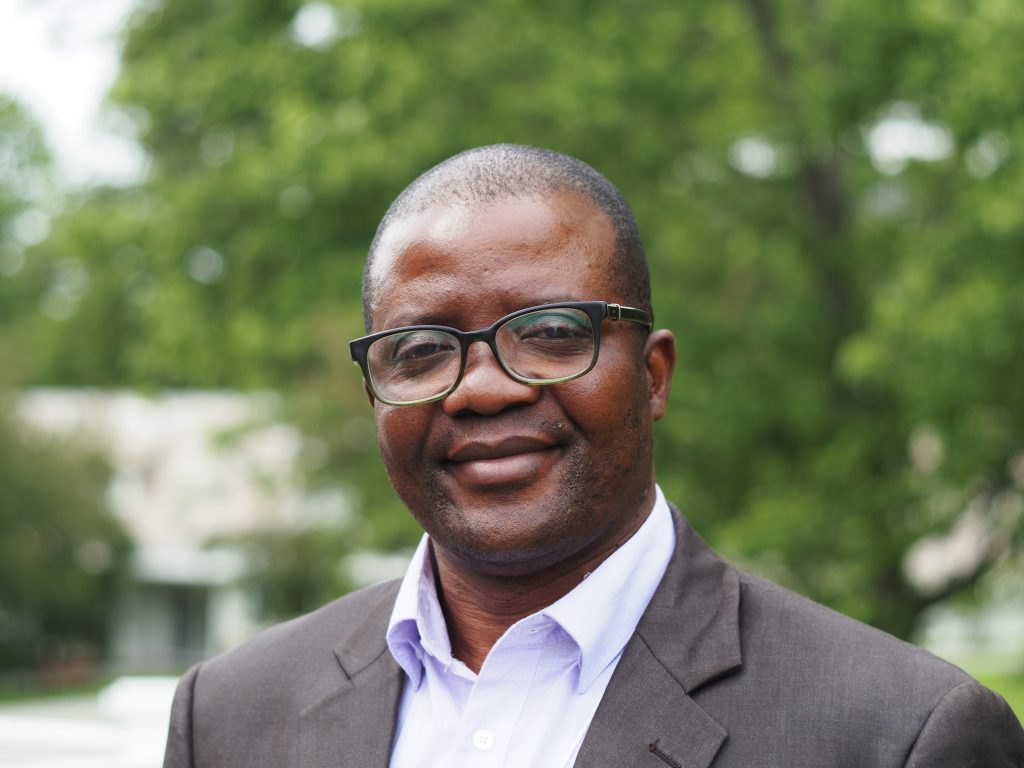
Abel Learwellie came to CONTACT to enrich his knowledge of the work he’s already doing as executive director of the Camp for Peace Liberia, which brings together youth to learn about non-violent conflict resolution and peace education. “Everything we do here is practical, which leaves a very good imprint on your mind. I’ll be able to apply these practical concepts in my day-to-day work,” he says.
Learwellie particularly enjoys the opportunities to exchange ideas with peers from across the world — including Rwanda, Spain, the U.S., and Canada — who have different experiences and perspectives on peace and conflict transformation. “Everyone is bringing their experiences,” he says. “I’m learning a lot from my peers and they’re also learning from me. It’s give and take.”
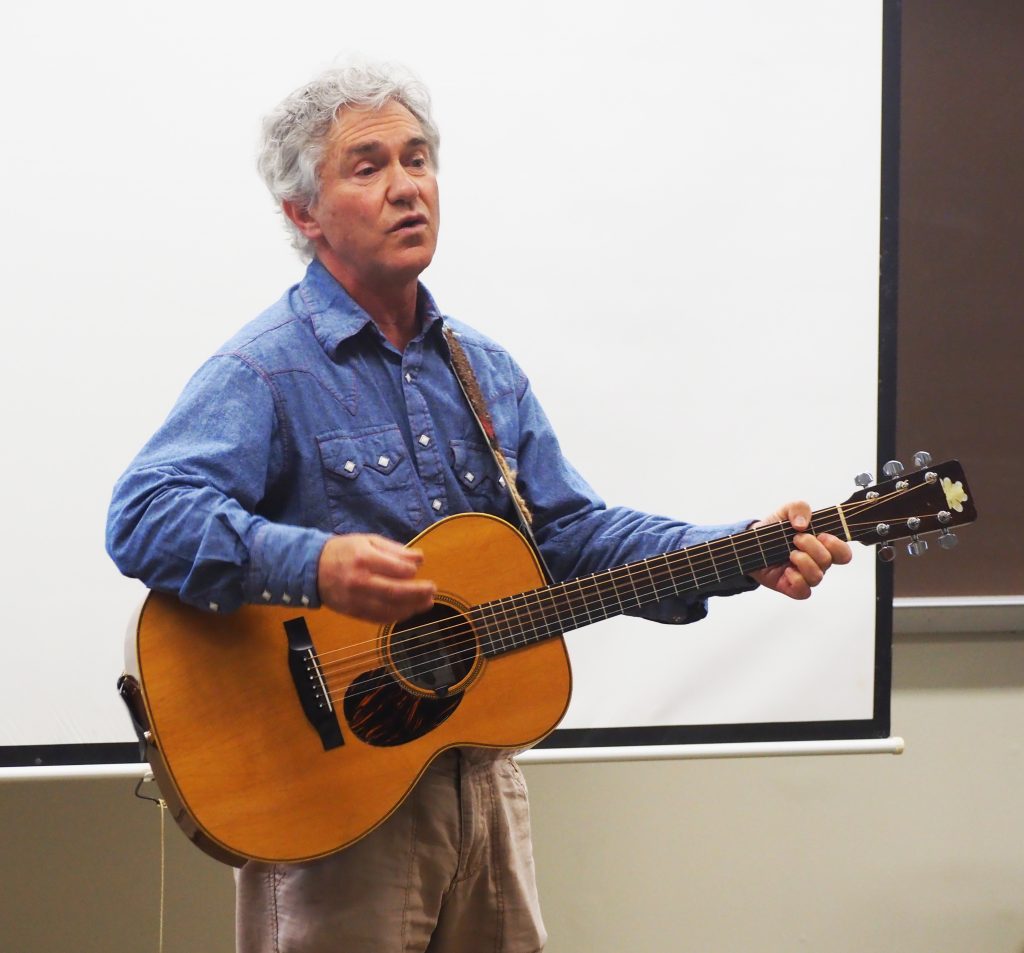
Some CONTACT participants are new to the field of peacemaking, or come to the program to augment work they do in other fields. Others, like Learwellie, arrive with careers in the field well underway.
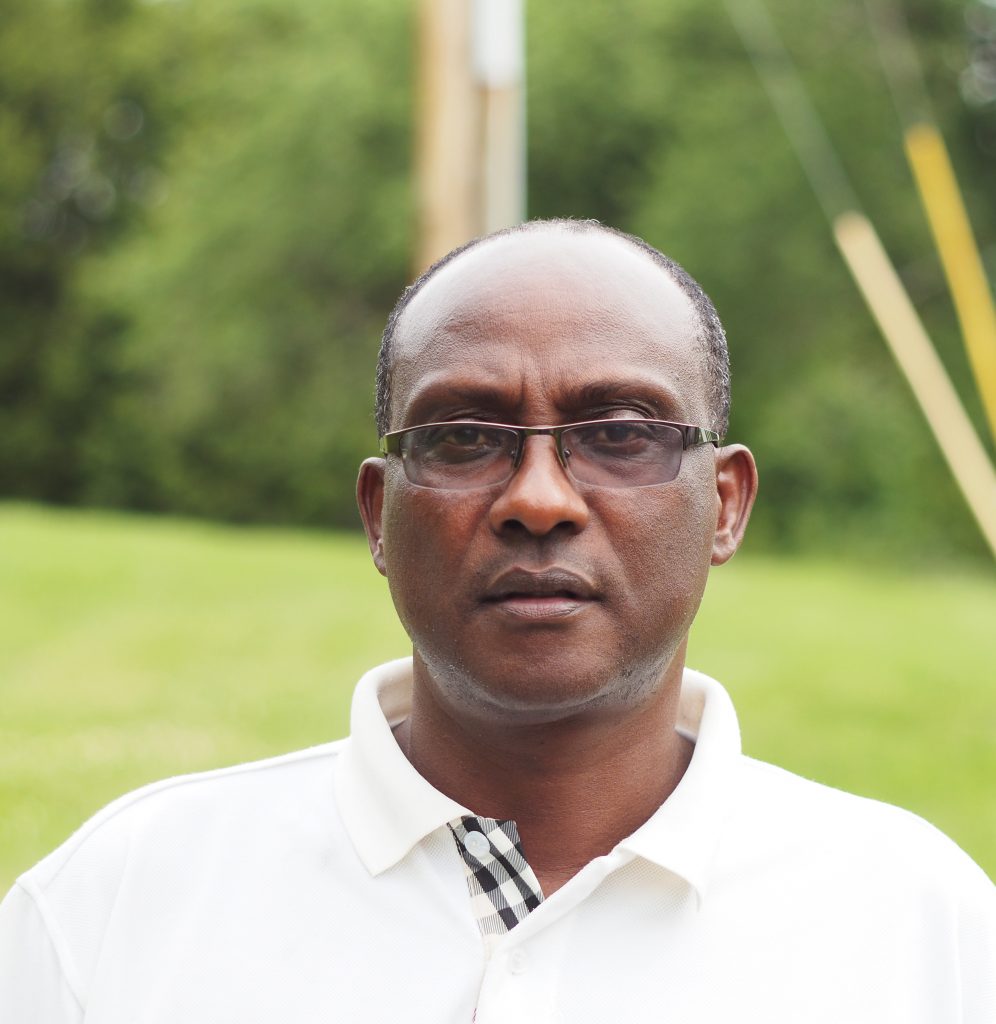
Conflict transformation is at the heart of Johnson Mugaga’s role at the National Unity & Reconciliation Commission of Rwanda, established to unite the country in the aftermath of that country’s 1994 genocide. As division manager in charge of programs, he often works with researchers and experts, and wanted to gain a better understanding of their technical knowledge. “The best place to get it is CONTACT,” he says.
Not only is the program giving him better insight into his work, but Mugaga says the scenic peace of the SIT campus has been very conducive to learning. “It’s a good environment for anything academic,” he says.
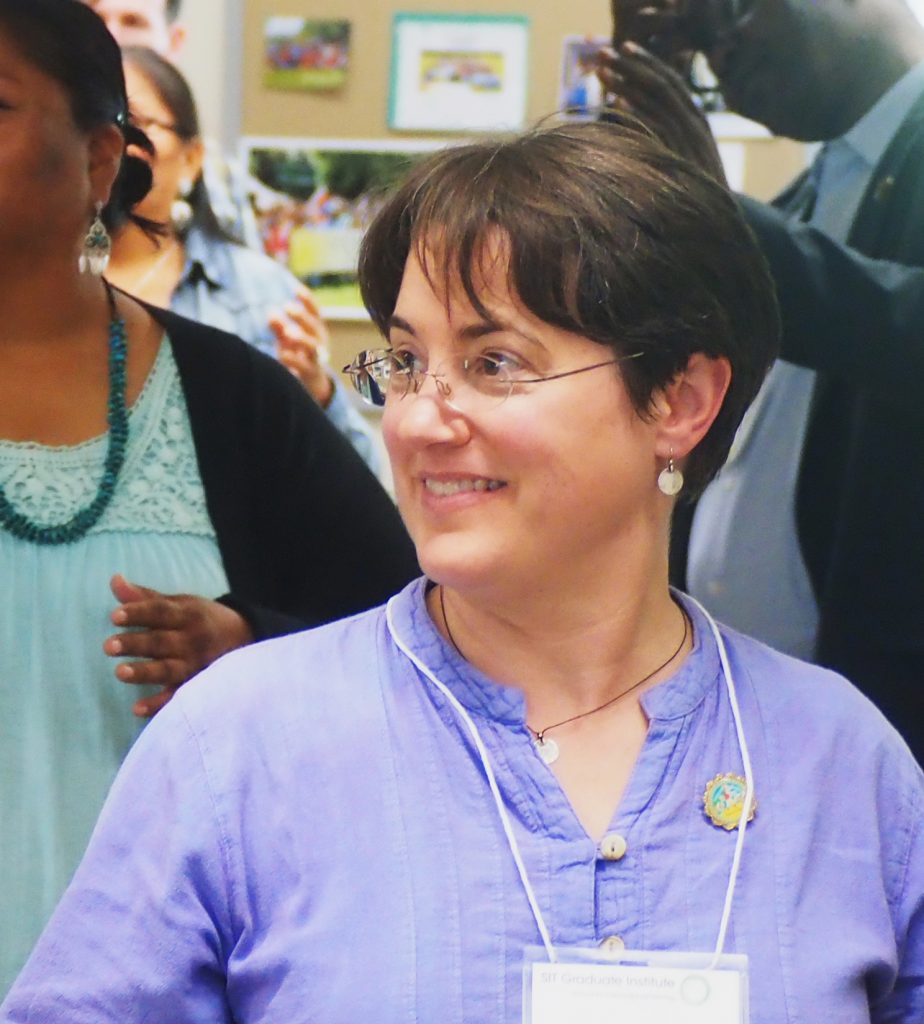
Another of this year’s participants is Kerry Ryer-Parke, who teaches voice at Bennington College in Vermont. Though at first glance it may seem unusual for a music teacher to study peacebuilding, it’s a natural progression for Ryer-Parke.
“I believe in music as a community-building activity. I’m looking to design courses that combine music and peacebuilding,” she says.
The organization Musicians Without Borders is also a key part of the CONTACT program, offering electives in just this sort of combination. Ryer-Parke says she’s found that their work has offered her a well-researched foundation for things she, as a music teacher, already found herself understanding on a more intuitive, instinctual level.
“They’ve discussed how trauma interferes with things like cognition. And music has the ability to bring the brain back into function because it uses the body, it uses rhythm, it uses both hemispheres of the brain.”
Echoing the sentiments of many students, Ryer-Parke adds that her time on campus has proven fruitful not solely because of academic work, but in part because of the opportunity to get to know people from different backgrounds and cultures.
